| Listing 1 - 10 of 10 |
Sort by
|
Book
ISBN: 0924922559 0924922052 Year: 1991 Publisher: Atascadero Ridgeview
Abstract | Keywords | Export | Availability | Bookmark
 Loading...
Loading...Choose an application
- Reference Manager
- EndNote
- RefWorks (Direct export to RefWorks)
Semantics (Philosophy) --- Sémantique (Philosophie) --- History --- Histoire --- Frege, Gottlob, --- Sémantique (Philosophie)
Book
ISBN: 9782711304509 Year: 1991 Publisher: Paris : Ed. Universitaires,
Abstract | Keywords | Export | Availability | Bookmark
 Loading...
Loading...Choose an application
- Reference Manager
- EndNote
- RefWorks (Direct export to RefWorks)
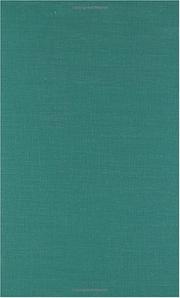
ISBN: 0226280845 0226280853 0226280861 0226280888 9780226280882 Year: 1991 Publisher: Chicago (Ill.): University of Chicago press
Abstract | Keywords | Export | Availability | Bookmark
 Loading...
Loading...Choose an application
- Reference Manager
- EndNote
- RefWorks (Direct export to RefWorks)
Language and languages --- Logic --- Semantics (Philosophy) --- Langage et langues --- Logique --- Sémantique (Philosophie) --- Philosophy --- Philosophie --- Logic. --- Philosophy. --- Sémantique --- 801.56 --- Syntaxis. Semantiek --- 801.56 Syntaxis. Semantiek --- Sémantique (philosophie) --- Philosophie du langage --- Sémantique (Philosophie) --- Semantics (Philosophy). --- Sémantique. --- Logique. --- Philosophie du langage. --- Language and languages - Philosophy. --- Sémantique (philosophie)
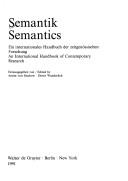
ISBN: 3110126966 9786612195983 311916691X 1282195980 3110203367 9783110126969 Year: 1991 Volume: 6 Publisher: Berlin De Gruyter
Abstract | Keywords | Export | Availability | Bookmark
 Loading...
Loading...Choose an application
- Reference Manager
- EndNote
- RefWorks (Direct export to RefWorks)
Das Anliegen diese Handbuches ist es, das in den beiden letzten Jahrzehnten internationaler Forschung erarbeitete Wissen in der Semantik in repräsentativer Weise darzustellen. Einige Theorien sind mittlerweile klassisch, d.h. gehören zu dem anerkannten Fundus linguistischen Wissens, das auch in der Zukunft Bestand haben wird. Andere Theorien sind heute noch umstritten; und es gibt - wie in jeder entwickelten Wissenschaft - einige Probleme, für die es bisher keine Lösungen gibt. Die Beiträge versuchen, sowohl das anerkannte wie auch das problematische Wissen in entsprechender Abwägung zu repräsentieren. Als Autoren wurden international führende Experten gewonnen, die in ihrem Beitrag auch ihre persönliche "Handschrift" erkennen lassen. Die Artikel sind teils in englisch und teils in deutsch verfaßt. Semantik wird von den Herausgebern als Disziplin der Sprachwissenschaft verstanden. Daher ist die Gliederung auch an linguistischen Gesichtspunkten orientiert. Die ersten 5 Kapitel stellen die gemeinsamen Grundlagen dar; ontologische Grundlegung der Semantik, kompositionaler Aufbau von Bedeutung, Probleme des Sprachgebrauchs (Kontexte, Sprechakte) und lexikalische Basis von Bedeutungen. In den folgenden 5 Kapiteln werden die Bedeutungsprobleme präsentiert, die sich aufgrund einzelner sprachlicher Phänomene stellen, zusammen mit den Theorien und offenen Fragen. Für die Ordnung der Sprachphänomene bietet sich die Einteilung nach den Wortarten und der durch sie bestimmten Satzteile dar, also Nomina, Funktionswörter, Verben, Adjektive usw. Mit dieser Einteilung selbst verbindet sich noch keine theoretische Position, sie erlaubt aber, zusammengehörige Problemkomplexe zu erkennen. Einige übergeordnete Fragestellungen treten dann in mehreren Artikeln, aber unter verschiedener Perspektive oder Nachbarschaft auf. Das Handbuch wird ergänzt durch einen Service-Artikel über formale Methoden in der Semantik, eine zusammenfassende Bibliographie von etwa 1700 Titeln sowie ein Sach- und ein Personenregister. Für die Forschung in Linguistik und Nachbarwissenschaften (Sprachphilosophie, Kognitionswissenschaften) ist das Handbuch unentbehrlich. Einzelne Artikel des Handbuches können auch Grundlage für Lehrveranstaltungen für Fortgeschrittene sein. During the past 20 years the investigation into meaning of natural languages has emerged into one of the most active disciplines in theoretical linguistics. The different traditions of linguistics, philosophy of language and philosophical logic converged in the paradigm of truth conditional semantics, which now plays a central role in the cognitive sciences. From empirical research in particular languages more principal questions arise of how the speaker succeeds in expressing particular types of meaning by use of formal combination of signs. The theories developed to cope with the question assume that for a hearer, the meaning of a complex expression must be "computable", and therefore, modern theoretical semantics uses formal algebraic methods to construct the meaning compositionally in view of syntactic structur. Furthermore, meaning need to be "anchored" in the experience available to hearer. In order to deal with this, theoretical semantics extensivly uses the concept of truth conditions, which roughly explain how a world must be structured in order to be matched by certain linguistic expressions. Semantic analyses are complemented by context theory and the theory of speech acts. Thus, linguistic meaning must be related to human cognitive capacities, and therefore, theoretical semantics is tightly connected with philosophical logic as well as cognitive sciences in general. The aim of this handbook is to represent the body of theoretical knowledge which has evolved in the international research of the last two decades. Some of the theories can now be termed "classical" in that they belong to the commonly accepted base of theoretical semantics. Other theories are still disputed, and there areproblems still to be solved - as normal in a more developed science. The authors, who are leading experts in the field of semantics, try to balance the accepted and the questionable results. It goes without saying that each author hold a particular position in this respect. Some articles are written in English, some in German. Since semantics is considered to be a subfield of linguistics, the articles are arranged due to linguistic points of view. In the first 5 chapters (comprising 15 articles) the common principles of semantics are presented: ontological foundations of semantics, composition of meaning, problems of use (context, speech acts, and lexical base of meaning. The next 5 chapters (comprising 25 articles) are concerned with semantic phenomena, theories and problems which are specific for a particular class of linguistic expressions. These are arranged according to parts of speech: nouns, functional categories, verbs, adjectives and so on.This division does not reflect a theoretical position by itself, however it allows one to recognize problems connected with one another. Some more general questions are discussed in more than one article, in different perspective and vicinity. The Handbook is complemented by a service article on formal methods in semantics, followed by a comprehensive bibliography including about 1700 entries, and both a subject and a name index. This handbook is indispensable for all research in linguistics and neighboring disciplines (philosophy of language, cognitive sciences). Some of the articles can serve as basic literature for classes of advanced students.
Lexicology. Semantics --- Semantics --- Semantics (Philosophy) --- Semantiek --- Semantiek (Filosofie) --- Sémantique --- Sémantique (Philosophie) --- Sémasiologie --- 801.56 --- Syntaxis. Semantiek --- 801.56 Syntaxis. Semantiek --- Sémantique --- Semantics. --- Linguistics. --- Linguistic science --- Science of language --- Language and languages --- Formal semantics --- Semasiology --- Semiology (Semantics) --- Comparative linguistics --- Information theory --- Lexicology --- Meaning (Psychology)
Book
ISBN: 2707314013 9782707314017 Year: 1991 Publisher: Paris : Editions de Minuit,
Abstract | Keywords | Export | Availability | Bookmark
 Loading...
Loading...Choose an application
- Reference Manager
- EndNote
- RefWorks (Direct export to RefWorks)
Logic, Symbolic and mathematical --- Proof theory --- Truth --- Semantics (Philosophy) --- Linguistics --- Logique symbolique et mathématique --- Théorie de la preuve --- Vérité --- Sémantique (Philosophie) --- Linguistique --- Methodology --- Méthodologie --- Logique --- --Philosophie --- --Logique --- --Logic, Symbolic and mathematical --- Logique symbolique et mathématique --- Théorie de la preuve --- Vérité --- Sémantique (Philosophie) --- Méthodologie --- Philosophie
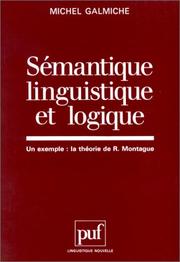
ISBN: 2130429572 9782130429579 Year: 1991 Publisher: Paris Presses universitaires de France
Abstract | Keywords | Export | Availability | Bookmark
 Loading...
Loading...Choose an application
- Reference Manager
- EndNote
- RefWorks (Direct export to RefWorks)
Lexicology. Semantics --- Philosophy of language --- Montague, R. --- Semantics --- Semantics (Philosophy) --- Sémantique --- Sémantique (Philosophie) --- Montague, Richard, --- Contributions in semantics --- Semantics. --- Intension (Philosophy) --- Logical semantics --- Semantics (Logic) --- Semeiotics --- Significs --- Syntactics --- Unified science --- Language and languages --- Logic, Symbolic and mathematical --- Logical positivism --- Meaning (Psychology) --- Philosophy, Modern --- Semiotics --- Signs and symbols --- Symbolism --- Analysis (Philosophy) --- Definition (Philosophy) --- Formal semantics --- Semasiology --- Semiology (Semantics) --- Comparative linguistics --- Information theory --- Lexicology --- Montague, Richard --- -Contributions in semantics --- Semantics (Philosophy). --- Sémantique --- Sémantique (Philosophie) --- Montague (richard), linguiste
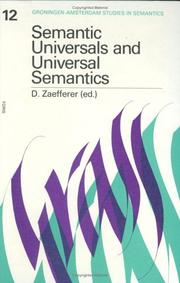
ISBN: 3110133911 Year: 1991 Volume: 12 Publisher: Berlin Foris
Abstract | Keywords | Export | Availability | Bookmark
 Loading...
Loading...Choose an application
- Reference Manager
- EndNote
- RefWorks (Direct export to RefWorks)
Lexicology. Semantics --- Semantics --- Semantics (Philosophy) --- Universals (Linguistics) --- Sémantique --- Sémantique (Philosophie) --- Universaux (Linguistique) --- Language and languages --- Linguistics --- Typology (Linguistics) --- Intension (Philosophy) --- Logical semantics --- Semantics (Logic) --- Semeiotics --- Significs --- Syntactics --- Unified science --- Logic, Symbolic and mathematical --- Logical positivism --- Meaning (Psychology) --- Philosophy, Modern --- Semiotics --- Signs and symbols --- Symbolism --- Analysis (Philosophy) --- Definition (Philosophy) --- Formal semantics --- Semasiology --- Semiology (Semantics) --- Comparative linguistics --- Information theory --- Lexicology --- Universals --- Linguistic universals --- Semantics. --- Linguistic universals. --- Semantics (Philosophy). --- Sémantique --- Sémantique (Philosophie)
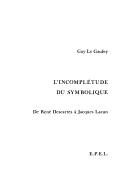
ISBN: 2908855038 Year: 1991 Publisher: Paris EPEL
Abstract | Keywords | Export | Availability | Bookmark
 Loading...
Loading...Choose an application
- Reference Manager
- EndNote
- RefWorks (Direct export to RefWorks)
Theory of knowledge --- Depth psychology --- Semantics (Philosophy) --- Symbolism --- Psychoanalysis and philosophy --- Sémantique (Philosophie) --- Symbolisme --- Psychanalyse et philosophie --- SYMBOLISM --- Psychoanalysis --- Gödel, Kurt F., --- Théorème --- --Frege, Gottlob (1848-1925) --- Logique --- --Descartes, René, --- history --- 4434 --- Symbolism. --- Philosophy and psychoanalysis --- Philosophy --- Representation, Symbolic --- Symbolic representation --- Mythology --- Emblems --- Signs and symbols --- Symbolism (Psychology) --- Symbolisms --- Symbolisms (Psychology) --- history. --- Sémantique (Philosophie) --- Intension (Philosophy) --- Logical semantics --- Semantics (Logic) --- Semeiotics --- Significs --- Syntactics --- Unified science --- Language and languages --- Logic, Symbolic and mathematical --- Logical positivism --- Meaning (Psychology) --- Philosophy, Modern --- Semiotics --- Analysis (Philosophy) --- Definition (Philosophy) --- --Frege, Gottlob,
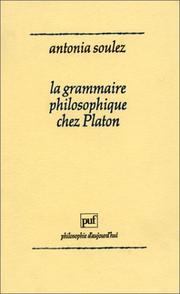
ISSN: 07680805 ISBN: 2130433855 9782130433859 Year: 1991 Volume: vol *68 Publisher: Paris PUF
Abstract | Keywords | Export | Availability | Bookmark
 Loading...
Loading...Choose an application
- Reference Manager
- EndNote
- RefWorks (Direct export to RefWorks)
Philosophy of language --- Historical linguistics --- Grammar --- Plato --- Semantics (Philosophy) --- Semantiek (Filosofie) --- Sémantique (Philosophie) --- Logic. --- Meaning (Philosophy) --- Language and languages --- Philosophy. --- Logic --- -Foreign languages --- Languages --- Anthropology --- Communication --- Ethnology --- Information theory --- Meaning (Psychology) --- Philology --- Linguistics --- Philosophy --- Argumentation --- Deduction (Logic) --- Deductive logic --- Dialectic (Logic) --- Logic, Deductive --- Intellect --- Psychology --- Science --- Reasoning --- Thought and thinking --- Methodology --- Aflāṭūn --- Aplaton --- Bolatu --- Platon, --- Platonas --- Platone --- Po-la-tʻu --- Pʻŭllatʻo --- Pʻŭllatʻon --- Pʻuratʻon --- Πλάτων --- אפלטון --- פלאטא --- פלאטאן --- פלאטו --- أفلاطون --- 柏拉圖 --- 플라톤 --- -Philosophy --- Contributions in philosophy of language --- Plato. --- Language and languages - Philosophy.

ISBN: 0792312392 0792312406 9401132127 Year: 1991 Volume: 45 Publisher: Dordrecht Kluwer
Abstract | Keywords | Export | Availability | Bookmark
 Loading...
Loading...Choose an application
- Reference Manager
- EndNote
- RefWorks (Direct export to RefWorks)
Logic --- Lexicology. Semantics --- Philosophy of language --- Dialectic (Logic) --- Dialectiek (Logica) --- Dialectique (Logique) --- Logica --- Logique --- Semantics --- Semantics (Philosophy) --- Semantiek --- Semantiek (Filosofie) --- Sémantique --- Sémantique (Philosophie) --- Sémasiologie --- Formal semantics --- Semasiology --- Semiology (Semantics) --- Comparative linguistics --- Information theory --- Language and languages --- Lexicology --- Meaning (Psychology) --- Argumentation --- Deduction (Logic) --- Deductive logic --- Logic, Deductive --- Intellect --- Philosophy --- Psychology --- Science --- Reasoning --- Thought and thinking --- Intension (Philosophy) --- Logical semantics --- Semantics (Logic) --- Semeiotics --- Significs --- Syntactics --- Unified science --- Logic, Symbolic and mathematical --- Logical positivism --- Philosophy, Modern --- Semiotics --- Signs and symbols --- Symbolism --- Analysis (Philosophy) --- Definition (Philosophy) --- Methodology --- Logic. --- Semantics. --- Semantics (Philosophy). --- Sémantique --- Sémantique (Philosophie)
| Listing 1 - 10 of 10 |
Sort by
|

 Search
Search Feedback
Feedback About UniCat
About UniCat  Help
Help News
News